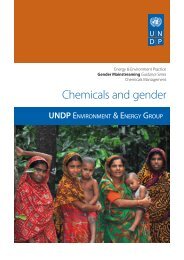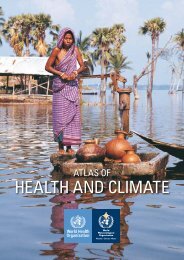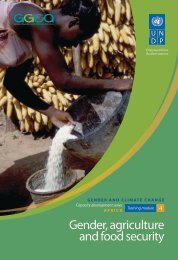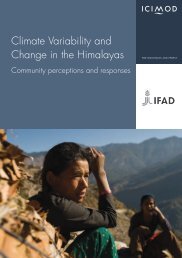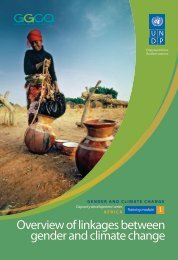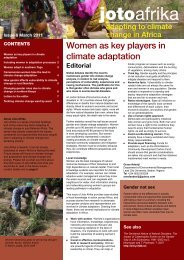Measuring health gains from sustainable development
Measuring health gains from sustainable development
Measuring health gains from sustainable development
- No tags were found...
You also want an ePaper? Increase the reach of your titles
YUMPU automatically turns print PDFs into web optimized ePapers that Google loves.
DisastermanagementHealth system resilience and capacity for emergencyrisk management are critical to effective disaster managementthat supports long-term goals of <strong>sustainable</strong><strong>development</strong>.• Monitoring and reporting on the human <strong>health</strong>aspects of disasters – as part of measures to improverisk assessment, prevention, preparedness, response,and recovery – is important for strengthening disasterrisk management. This will help reduce <strong>health</strong> impacts,particularly the loss of human lives.• Building <strong>health</strong> system resilience and capacity foremergency risk management, particularly at a community level, is critical to effective disaster management.• Indicators of <strong>health</strong> system resilience to natural disasters include the proportion of <strong>health</strong> facilities, newand improved, to withstand hazards, and with access to reliable clean energy and water supplies, routinelyand in emergencies.References1. Schutter OD. Report submitted by the Special Rapporteur on the right tofood, Olivier De Schutter. New York City, United Nations Human Rights Council,2011 (http://www.unscn.org/en/announcements/conferences/?id=650).2. Energy for a <strong>sustainable</strong> future: summary report and recommendations.New York, United Nations Secretary General’s Advisory Committee Groupon Energy and Climate Change, 2010.© World Health Organization 2012All rights reserved. Publications of the World Health Organization are availableon the WHO web site (www.who.int). The designations employed and thepresentation of the material in this publication do not imply the expression ofany opinion whatsoever on the part of the World Health Organization concerningthe legal status of any country, territory, city or area or of its authorities, orconcerning the delimitation of its frontiers or boundaries.The statements, opinions or conclusions contained herein, reflect the discussionsof an expert consultation and available evidence. All reasonableprecautions have been taken by the World Health Organization to verify theinformation contained in this publication. However, the published material isbeing distributed without warranty of any kind, either expressed or implied.The responsibility for the interpretation and use of the material lies with thereader. In no event shall the World Health Organization be liable for damagesarising <strong>from</strong> use.The statements, opinions and conclusions contained herein do not necessarilyrepresent the statements, opinions or conclusions of the NIEHS, NIH or theUnited States government.Cover photo: Seoul, South Korea – urban highway transformed to park andwaterway. Zack Lee, via Flickr.com (riacale)Inside and back cover photos, left to right: ©FAO/Giuseppe Bizzarri;Nic Bothma/Kuyasa CDM; stock photo; stock photo; WHO/Armando WaakDesign by Inís Communication – www.iniscommunication.comWHO/HSE/PHE/7.6.2012These briefings present initial findings <strong>from</strong> a WHOExpert Consultation, 17–18 May 2012 in Geneva. Theconsultation included over 40 participants with expertisein <strong>health</strong>, equity, <strong>development</strong> and environment<strong>from</strong> research institutions, government, and multi- lateral/bilateral <strong>development</strong> agencies.The briefings also draw upon previous work by WHOand WHO regional offices on <strong>health</strong> in the green economy;urban transport and housing; <strong>health</strong>y cities; socialdeterminants of <strong>health</strong>; gender; traffic injury; dietand physical activity; disaster management; as well asframeworks for indicators and assessment of <strong>health</strong> equity;<strong>health</strong> risks and environmental burden of disease.The expert consultation was co-sponsored and supportedby the National Institute of Environmental HealthSciences, USA.Public Health & Environment Department (PHE)Health Security & Environment Cluster (HSE)World Health Organization (WHO)Avenue Appia 20, CH-1211 Geneva 27, Switzerlandwww.who.int/phe/en/http://www.who.int/hia/green_economy/en/index.htmlHealth in the green economy



